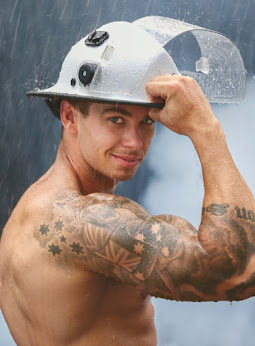Every Friday I like to highlight firefighters (and their amazing physiques). In today's blog, you'll learn that 20% firefighters suffer from PTSD, how to recognize the signs, and what to do to get them help. It's the least we can do.
EmergencyReporting.com Provided Signs Station Crew Should Watch Out For
SIGN #1: INTRUSIVE MEMORIES
People experiencing PTSD often relive traumatic event(s) in vivid memories, which can manifest as flashbacks or nightmares.
SIGN #2: AVOIDANCE BEHAVIORS
It’s common for those with PTSD to avoid reminders and feelings associated with their trauma. Examples of these could be certain places, activities, or people. This can cause a potential disruption in the person’s normal daily routine.
SIGN #3: INCREASED AROUSAL AND REACTIVITY
Symptoms of PTSD related to this can include increased anger or aggression, irritability, insomnia, hypervigilance, and hypersensitivity.
SIGN #4: NEGATIVE CHANGES IN MOOD AND THOUGHT
It’s also common for those with PTSD to experience an array of other mental health disorders along with their PTSD. These can include anxiety, depression, and mood disorders. Some symptoms of these may include feelings of detachment and guilt, lack of interest in previously enjoyed activities, negative mood, and distorted beliefs about oneself, others and the world.
SIGN #5: “VORTEX OF NUMB”
The vortex here refers to the stupor your spouse may seem to enter when returning home from work and tuning out the rest of the world by becoming engrossed in the TV, iPad or computer. If they are unable to come out of this “vortex” to answer questions or turn their attention to something else, it may be cause for worry.
SIGN #6: “GLASS TEST”
This test has to do with how we handle stress. People without PTSD usually start their days with an empty glass that fills up with different stressors as the day goes on. Someone suffering from PTSD will start their days with a glass that is already three quarters full. The glass test is seeing how quickly your spouse’s glass overflows and if those stresses are “normal”. Is their threshold of being overwhelmed very low?
SIGN #7: “WHATEVER WASTELAND”
Anyone who has ever had a teenager, knows this one well. Does your spouse take responsibility or make decisions without being asked?
SIGN #8: “I USED TO SYNDROME”
Does your spouse often talk about things they used to do that they enjoyed, but don’t do anymore? Keep track of how much they talk about these things and see if you can try to create situations where they can do these things again.
How can a firefighter help with PTSD?



No comments:
Post a Comment